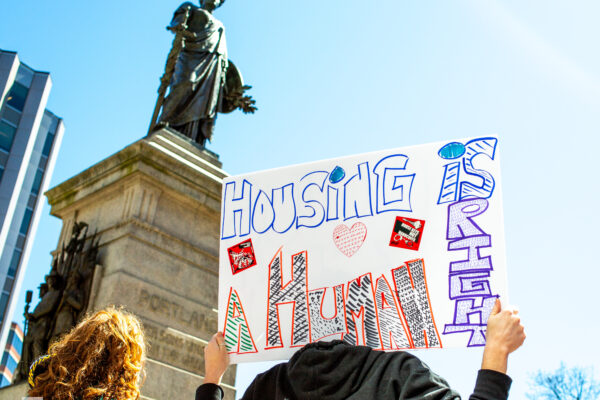A proposed ordinance before the Bangor City Council would restrict free speech under the guise of public safety.
BANGOR – A Bangor City Council committee on Monday considered an unconstitutional proposal to ban people from being on certain medians and impose fines up to $2,500, even if they are not creating a safety hazard. Existing law restricts activities that impede or disrupt public streets, highways, and sidewalks.
The proposal mirrors similar state and local ordinances throughout the country that courts have found violate the free speech rights of people who want to engage in expressive conduct on medians, including solicitation of charity or political protest. These restrictions are often passed in the name of public safety but are clearly designed to single out and criminalize unhoused and low-income community members.
“Banning peaceful, non-threatening speech in public spaces violates the First Amendment of the U.S. Constitution,” said ACLU of Maine Executive Director Molly Curren Rowles. “Public spaces, such as streets and parks, are essential places for people to communicate ideas, discuss public questions, and exist as they are. Cities should not be in the business of telling people where they can and cannot exercise their constitutional rights, and they certainly should not ban speech in long-standing forums for public dialogue.”
Similar laws have been struck down in state and federal courts, including a Portland ordinance adopted in 2013. In 2014, a federal appeals court struck down Portland’s “median ban” following a lawsuit from the ACLU of Maine and Goodwin Procter LLP. Portland spent $175,000 in taxpayer dollars defending its unconstitutional policy. Numerous other cities have spent thousands after courts reversed unconstitutional ordinances restricting activities in public spaces, including Manchester and Hudson, NH, Albuquerque, NM, Lexington, KY, Cranston, RI, and Fall Rivers, MA.
Additionally, criminalizing this peaceful conduct in public spaces ignores the root causes of homelessness and makes it even more difficult for people to regain housing. Many people with limited resources cannot pay fines and become further entangled in the legal system, which imposes even greater barriers to housing and employment. Attempting to punish people out of poverty is the least effective and most expensive response to this growing housing crisis. According to a wide body of research, increasing access to housing, health care, and education reduces homelessness rates and saves taxpayer dollars.
The proposal is likely to receive initial consideration before the full council on Monday, June 10.
Stay Informed
Sign up to be the first to hear about how to take action.
By completing this form, I agree to receive occasional emails per the terms of the ACLU’s privacy statement.
By completing this form, I agree to receive occasional emails per the terms of the ACLU’s privacy statement.


